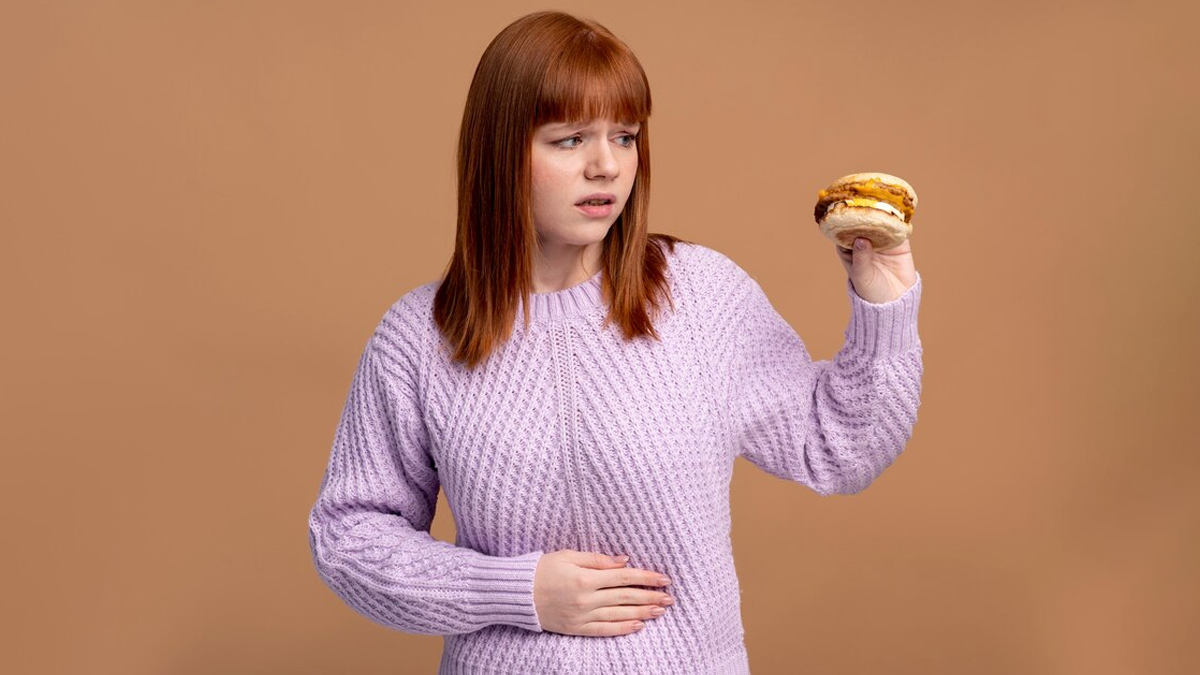
Have you ever finished eating a meal and suddenly felt drowsy, uncomfortably full, or in dire need of a nap? While stress, sleep, and lifestyle certainly play their role in this, your daily food habits may have more to do with it than you know. Some everyday foods in our diet can quietly cause digestive discomfort, water retention, or make our blood sugar go on a roller coaster ride, all of which leave you bloated and fatigued. The key to avoiding this is by being aware of these culprits to help enable you to make conscious exchanges that foster long-term energy and belly comfort.
Table of Content:-
We reached out to our expert, Shrey Kumar Srivastav, Senior Consultant and General Physician, Sharda Hospital - Noida, to understand what food items to steer clear of, and he shared with us easy and practical food habits that can reduce bloating and fatigue while also improving overall health and wellness.
Everyday Foods That Quietly Trigger Bloating & Fatigue
According to Dr Srivastav, these seven food items tend to quietly trigger bloating and fatigue:
1. Processed Foods and Refined Carbohydrates
Fast foods, white bread, pastries, and breakfast cereals contain quick energy but tend to cause high blood sugar levels quickly. “The body reacts with an insulin burst followed by a crash that makes you feel tired. Even worse, most of these foods have too much sodium and water-retaining additives that make you feel puffy,” Dr Srivastav explained.
Healthier Alternative: Choose whole grains such as brown rice, quinoa, oats, or whole-wheat bread that release energy slowly and aid digestion.
2. Carbonated Drinks
Soda or sparkling water might taste refreshing, but the carbonation in them puts additional air into your digestive system. Excess gas leads to bloating, discomfort, and belching. And many soft drinks contain sugar or artificial sweeteners, both of which can trigger fatigue.
Healthier Alternative: Dr Srivastav recommended opting for plain water, lemon or cucumber-infused water, or herbal teas to hydrate without the bloat.

3. Lactose Products (for Lactose Intolerants)
Milk, cheese, and ice cream are diet staples in many households, but for those with even mild lactose intolerance, they can cause bloating, cramping, or fatigue following consumption. Lactose that is not digested ferments in the intestine, creating gas and discomfort. Even without intolerance, fatty dairy products slow down digestion and make you feel lethargic.
Healthier Alternative: “Switch to lactose-free dairy, plant-based milk (almond, oat, soy), or hard cheeses and yoghurt with live cultures, which are softer on digestion,” he added.
4. Cruciferous Vegetables (in Excess)
Broccoli, cauliflower, cabbage, and Brussels sprouts are superfoods full of nutrients, but also raffinose, a complicated sugar that the gut has trouble digesting. This process of fermentation creates gas, which can cause bloating. They tend to exacerbate the effect when eaten raw.
Healthier Alternative: Steam or sauté cruciferous vegetables to break down some of the raffinose, or combine them with gut-soothing herbs like ginger and cumin to facilitate digestion.
5. Artificial Sweeteners
Sugar-free gum, diet sodas, and low-calorie snacks tend to be made with sorbitol, xylitol, or aspartame. These sweeteners can be poorly digested by the gut, leading to fermentation, gas production, and bloating. They can also throw gut microbiota balance off, impacting energy and digestion.
Healthier Alternative: Incorporate natural sweeteners such as honey, stevia, or a bit of maple syrup, but remember moderation.
Also Read: Vicky Kaushal, At 37 & Katrina Kaif, at 42, Is There a Right Age for Having a Baby?

6. Processed Meats and Salty Foods
Studies suggest that salty foods, such as cured meats, instant noodle soups, or chips, trigger the body to retain water. Dr Srivastav pointed out that this leads to bloating and puffy skin, especially around the stomach area and face. “Besides, processed meats usually contain nitrates and preservatives, which can tax digestion and make you feel bloated,” he said.
Healthier Alternative: Season meals with herbs, spices, and citrus rather than salt. Opt for lean, unprocessed protein sources such as chicken, fish, eggs, or legumes.
7. Caffeine and Energy Drinks
Post-lunch coffee or energy drink can give you a temporary boost, but too much caffeine will cause dehydration (anytime of the day), shakiness, and ultimately exhaustion when the energy rush is gone. Energy drinks especially tend to mix sugar and stimulants, intensifying the crash.
Healthier Alternative: Stick to moderate amounts of coffee or switch to green tea, which provides a gentler caffeine boost along with antioxidants.
Bottomline
Bloating and fatigue are often dismissed as normal inconveniences, but your daily diet could be a silent culprit. By paying attention to how certain foods affect your body and making mindful swaps, you can maintain stable energy levels and reduce digestive discomfort.
Also watch this video
FAQ
Q1. Why do some foods bloat me so fast?
Salty, sweet, or poorly absorbed substances (such as lactose or raffinose) trigger water retention or gas production, leading to swelling.Q2. Does bloating and fatigue indicate a health problem?
Yes. Repeated symptoms can signal lactose intolerance, food sensitivities, or gastrointestinal issues such as IBS. When discomfort persists, see a physician.Q3. How do I minimise bloating and increase energy levels naturally?
Drink plenty of water, eat smaller, balanced meals, add foods with fibre, and limit processed and salty foods. Consistent exercise helps digestion.
How we keep this article up to date:
We work with experts and keep a close eye on the latest in health and wellness. Whenever there is a new research or helpful information, we update our articles with accurate and useful advice.
Current Version
Sep 26, 2025 09:51 IST
Modified By : Tanya SrivastavaSep 26, 2025 09:51 IST
Published By : Tanya Srivastava
